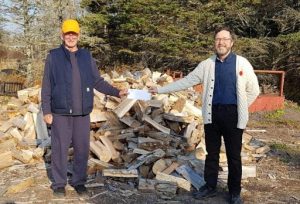This article, published in the Fall 2020 edition of The Beacon, was written by StFXAUT Communications Officer Philip Girvan.
The StFXAUT continues to sponsor the Antigonish Emergency Fuel Fund (AEFF). As in years past, the StFXAUT donation of $1800 allowed the AEFF to pre-order 6 loads of wood ($300/load) for households seeking help with firewood. The timing of the donation ensured that the wood was harvested before snowfall and will be dry when delivered.
For more information about the AEFF, please see the profile published in the Winter 2018 issue of The Beacon.

Heat poverty continues to be a significant issue in Antigonish Town and County, and COVID-19 has made things worse. People have lost work, lost their childcare, been served eviction notices. As a result, an increasing number of area households are falling behind in their payments to their heating suppliers.
This is not unique to Antigonish. It is happening all over the province. Mike MacDonald, AEFF President, noted in conversation that at the end of August 2020, twenty-two thousand Nova Scotia Power customers were in arrears. Fortunately, both Nova Scotia Power and the Town of Antigonish Electric Utility recognize these extraordinary times and are working with customers on payment arrangements. Many have signed contracts with their provider and disconnections are unlikely to happen over the winter.
Support available to those suffering from heat poverty is limited. Nova Scotia Power, who operates the Home Energy Assistance Top-up (HEAT Fund) in partnership with the Province of Nova Scotia and the Salvation Army, has made a $700,000 donation this year on top of their annual $200,000 donation. The HEAT Fund offers a maximum assistance in the amount of $400 for individuals and families. Demand has been such that the HEAT Fund is closed for 2020.
The Government of Nova Scotia offers help to low-income Nova Scotians via the Heating Assistance Rebate Program. Rebates range from $100 to $200. While this help is welcome, it is inadequate. Rebates, one-time grants, and payment arrangements will not take the place of lost income. Interest, late charges, and other penalties will continue to accrue, and those experiencing a loss or a diminishing of income fall further and further behind.
Last winter marked the first time that most AEFF requests came from households whose primary source of heating was electricity rather than oil, and there remains a real concern that, come springtime, a considerable number of households will have their power disconnected. Furnace oil, of course, could be cut off at any time. MacDonald emphasized to The Beacon the fact that the Society has limited resources. It is strictly an emergency supplier, and unable to satisfy all requests it receives. The AEFF depends on the generosity of those in the community, and those able to give this year are encouraged to call Mike MacDonald at (902) 863-8737. To apply for help, please call (902) 863-6221.
If you would like to support the AEFF, you may send a donation to Canada Helps.
